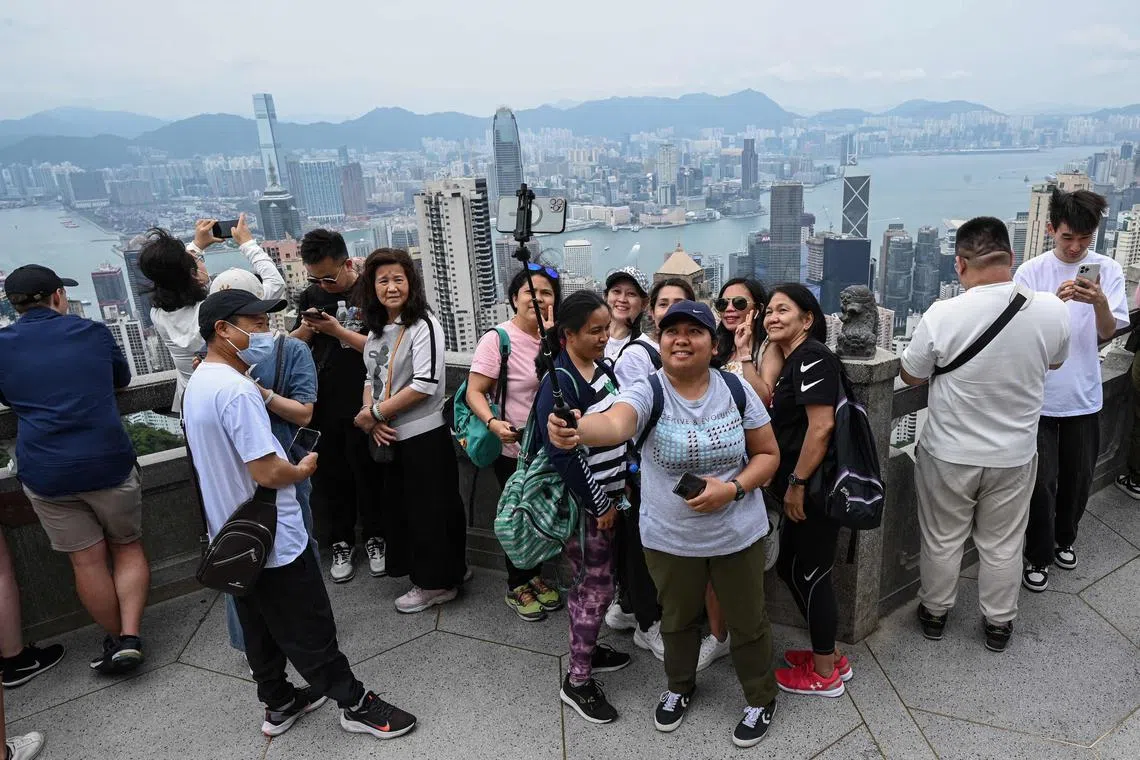Hong Kong to tap film tourism after local movie’s success at Cannes
Sign up now: Get insights on Asia's fast-moving developments

The Hong Kong government is discussing using film materials from Twilight Of The Warriors: Walled In for an exhibition to draw tourists to the city.
PHOTO: AFP
Follow topic:
HONG KONG – Hong Kong plans to tap its local films to help boost the city’s flagging tourism sector, after a Cantonese triad thriller featuring the Kowloon Walled City topped the Chinese box office and made it to the Cannes Film Festival.
The government is discussing using film materials from Twilight Of The Warriors: Walled In
Walled In, an action film directed by Soi Cheang and starring Louis Koo and Raymond Lam, is set in the 1980s in the shady enclave of the city’s now-demolished Kowloon Walled City.
The movie topped both the mainland’s and Hong Kong’s box offices for consecutive days after premiering at the start of May. In Hong Kong alone, opening-day takings were HK$5.3 million (S$917,280) – the all-time second-highest earnings for a local film, behind the 2016 police action flick Cold War 2.
At the Cannes Film Festival later the same month, it won critical acclaim and received a 10-minute standing ovation, with Hong Kong actor Lam describing Walled In’s screening at the prestigious event as “a huge step for promoting Hong Kong cinema globally”.
The film opened in Singapore on May 17. Worldwide, it has earned more than US$12 million (S$16.2 million) so far, according to film data site Box Office Mojo.
The popularity of the movie, whose budget came up to some HK$300 million, has inspired officials and lawmakers with ideas to milk its success.
Lawmaker Rock Chen told the Legislative Council (LegCo) on May 29 that Hong Kong should draw from South Korea’s and New Zealand’s experiences in preserving the film sets of popular local shows and develop them into novel travel itineraries and attractions to boost tourism.
Hong Kong, traditionally reliant on its tourism industry as a key pillar of its economy, has seen tourist arrivals plummet after the 2019 anti-government protests and Covid-19 pandemic. It recorded 34 million visitor arrivals in 2023, compared with 65 million in 2018.
While Walled In’s film sets have since been destroyed due to a lack of space after filming ended, Culture, Sports and Tourism Secretary Kevin Yeung said the government was “exploring organising an exhibition of the film-related materials such as stills, video footage and props to attract visitors and... facilitate the development of film tourism”.
On June 12, Mr Yeung’s deputy Raistlin Lau told the LegCo that the government is supporting activities to promote film culture, actively encouraging the international exposure of Hong Kong movies at film festivals and considering ways to attract more foreign movie-makers to film in the city, including offering one-stop services and subsidies.
“The government will continue to... leverage the cultural influence of films to strengthen tourism promotion and attract more visitors to Hong Kong,” Mr Lau said.
Hong Kong is no stranger to film tourism, with many locations across the city having gained popularity for appearing in films – both local and foreign – that have made it big.
The colonial-style buildings of the University of Hong Kong and the former Yau Ma Tei Police Station have long been tourist spots for their appearances respectively in the 1998 romantic film City Of Glass starring Leon Lai and Shu Qi, and the crime thriller series Infernal Affairs headlined by Tony Leung and Andy Lau in the early 2000s.
Apartment buildings in Quarry Bay also gained popularity among tourists after being featured in the 2014 Transformers: Age Of Extinction movie by Hollywood director Michael Bay.
Mr Paul Chan, chief executive of guided tour company Walk in Hong Kong, said his firm previously invested in a 2021 local film, Far Far Away, a romantic comedy whose plot weaved in far-flung and little-known places in Hong Kong of cultural or conservation significance.
“Movies are definitely an effective way of marketing potential tourist attractions, such as locations featured in Far Far Away like the historic Hakka walled village of Lai Chi Wo in north-eastern New Territories,” Mr Chan said.
“The movie did help improve the business of our guided tours to that village in particular,” he said, but added that efforts to promote film tourism could have better results if the government “provided clear direction and support to help us market these products”.
Assistant Professor Johnson Chan of the Chinese University of Hong Kong, who specialises in tourism sustainability, said it was crucial to plan for the long-term viability of film tourism in Hong Kong.
“It is essential to recognise that specific movies’ appeal may diminish over time as the films age,” Prof Chan said, adding that he does not support public investment in infrastructure such as a theme park based on a single movie.
“Instead, there can be thematic cultural and creative precincts in designated areas that showcase film-related attractions... that appeal to a broader range of local people and foreign visitors.”
Prof Chan also suggested diversifying film-related attractions to include festivals, guided tours and interactive experiences to sustain visitor interest, as well as collaborating with travel firms and online platforms to raise awareness worldwide of the city’s cinematic heritage.


